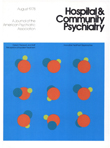The Medical Model and the Responsible Patient
Abstract
At Bryce Hospital patients whose illnesses are considered to have a biochemical basis, such as schizophrenia or manic-depressive illness, are assigned to a "responsible patient" class in which they are taught the rights and obligations of responsible patients: to know about the illness, to participate in treatment planning, and to follow treatment routines. The class is a segment of the instruction given in the hospital's Psychological Learning Center and is based on the medical model. The authors describe the class, the learning center, and the historical and theoretical antecedents of such an approach.
Access content
To read the fulltext, please use one of the options below to sign in or purchase access.- Personal login
- Institutional Login
- Sign in via OpenAthens
- Register for access
-
Please login/register if you wish to pair your device and check access availability.
Not a subscriber?
PsychiatryOnline subscription options offer access to the DSM-5 library, books, journals, CME, and patient resources. This all-in-one virtual library provides psychiatrists and mental health professionals with key resources for diagnosis, treatment, research, and professional development.
Need more help? PsychiatryOnline Customer Service may be reached by emailing [email protected] or by calling 800-368-5777 (in the U.S.) or 703-907-7322 (outside the U.S.).



